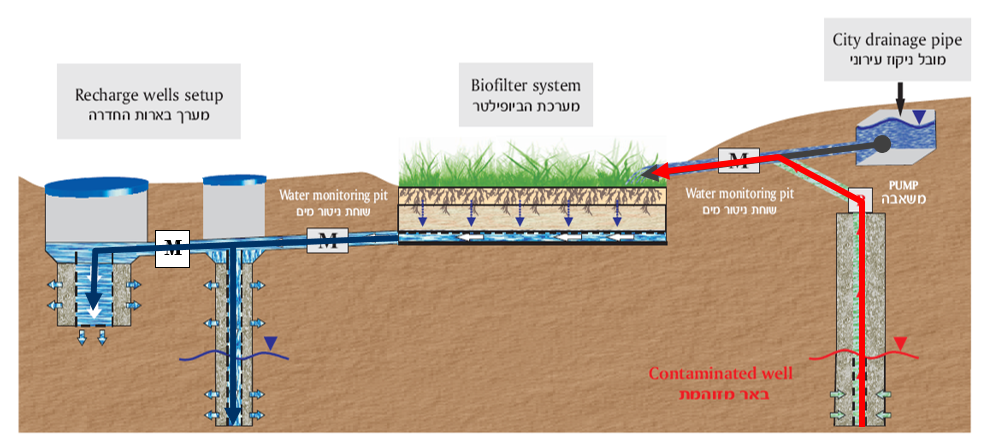Sustainable Mediterranean Cities
Dual-mode Biofilter System: Case study in Kfar Sava, Israel
Kfar Sava

- Israel
The pilot site is located within a future public park in the “Green Neighbourhood” of Kfar-Sava city (17km north east from Tel-Aviv). The system receives (1) gravity fed storm water by a 315mm diameter diversion storm water pipe installed off a main drainage culvert that drains a catchment of 300 ha (approximately one third of city area), and (2) polluted groundwater (with concentrations of nitrate of up to 150 mg/l) from a pressurized pipeline that connects three nearby extraction wells. The system consists of a storm water biofilter and two types of recharging wells (deep and shallow) as outlined in Figure 1.

Figure 1 The dual operation stormwater biofilter, Kfar-Sava, Israel
The first storm water biofilter in Israel built in Kfar-Sava was tested for a dual-purpose operation: (1) capture and treatment of stormwater during the wet season and (2) groundwater treatment (aquifer remediation) during dry season. The monitoring of nine events during winter 2010-2011 revealed that Kfar-Sava storm water is rather polluted with median Even Mean Concentrations (EMCs) of TSS, TN and TP of 600, 3.27, 0.89 mg/l respectively, well above the typical values found in storm water. The E.coli levels were within expected levels while some higher than typical metals concentrations were observed. Untreated storm water is considered not suitable for direct injection into groundwater or non-potable uses (such as outdoor irrigation). Storm water biofilter was found to treat this storm water to required standards for irrigation and infiltration (Inbar committee, 2010), meeting even the stringent TSS and E.coli targets of irrigation Australian Guidelines (2009).
Treated storm water monitored to date met all drinking water guidelines except for pathogens. This does not mean that the outflows are directly drinkable (without additional filtration and disinfection), but the data has demonstrated the potential of storm water harvesting and treatment as a potable water source.



